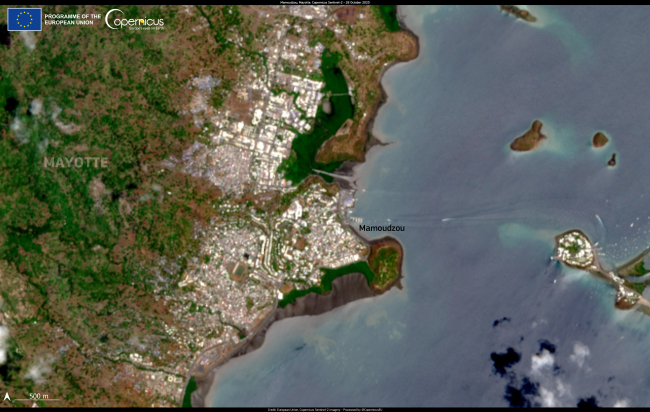Is Mayotte Still A Colony? Examining French Rule And Its Consequences

Table of Contents
Mayotte's Historical Context: From Sultanate to Overseas Department
Before French colonization, Mayotte was an independent sultanate, governed by its own rulers and possessing a distinct cultural identity. The French colonization process began gradually in the 19th century, marked by a series of treaties and military interventions.
- 1841: France establishes a protectorate over Mayotte.
- 1843: The Sultan of Mayotte signs a treaty ceding sovereignty to France.
- 1912: Mayotte becomes part of the French colony of Madagascar.
- 1975: Following the independence of the Comoros, Mayotte votes to remain under French rule.
- 1976: Mayotte officially becomes a territorial collectivity of France.
- 2011: Mayotte attains departmental status as an overseas department of France.
This transition from a sultanate to an overseas department fundamentally altered Mayotte's political status. While officially integrated into the French Republic, the implications of this departmental status remain a subject of ongoing discussion. The shift didn't erase the colonial legacy; rather, it presented a new framework for the relationship. The question persists: is this departmentalization a genuine step towards self-determination, or a sophisticated continuation of colonial control disguised as integration?
The Economic Realities of French Rule in Mayotte
Mayotte's economy is heavily reliant on France. Substantial financial aid flows from France to support various sectors, creating an undeniable economic dependence.
- Significant Infrastructure Projects: Funding for roads, ports, and utilities.
- Subsidies for Agriculture and Fisheries: Essential support for local industries.
- Civil Servant Salaries: A large portion of Mayotte's workforce is employed by the French government.
However, this significant French financial support doesn’t negate the economic challenges facing Mayotte. The reliance on France creates vulnerabilities; local industries struggle to compete, contributing to economic inequality and dependence, a common characteristic often associated with colonial systems. The question remains whether this dependence constitutes a form of neo-colonialism.
Political Representation and Self-Determination in Mayotte
Mayotte elects representatives to the French National Assembly and Senate, granting it a voice in French national politics. It also enjoys a degree of autonomy in managing local affairs through an elected departmental council.
- One Member of Parliament in the National Assembly
- One Senator in the French Senate
- An Elected Departmental Council responsible for local governance.
Despite this representation, debates surrounding self-determination and independence persist. While some advocate for greater autonomy or even independence, others firmly support continued affiliation with France, highlighting the perceived economic and security benefits. The ongoing dialogue between these diverse political viewpoints shapes Mayotte's trajectory and the future of its relationship with France.
Social and Cultural Impacts of French Rule
French culture and language have significantly permeated Mayotte. The French education system plays a central role in shaping the island's identity.
- French as the Official Language: Dominating education and administration.
- Integration of French Cultural Practices: Influencing lifestyle, media, and societal norms.
However, Mayotte's unique cultural heritage persists. The challenge lies in balancing the preservation of this heritage with integration into French society. This delicate balance continues to shape the social fabric of Mayotte, highlighting the complexities of assimilation and cultural preservation within the context of French rule.
The "Comorian" Question and the Ongoing Debate
The relationship between Mayotte and the Comoros remains a significant point of contention. The Comoros claims sovereignty over Mayotte, while Mayotte's residents have consistently chosen to remain part of France. This dispute underlines the ongoing debate surrounding Mayotte's status. Proponents of continued French rule emphasize economic stability and security, while advocates for independence or closer ties with the Comoros cite self-determination and historical grievances. Understanding these differing perspectives is crucial in analyzing the "Mayotte Colony" debate.
Conclusion
The question of whether Mayotte is still a colony is multifaceted and cannot be answered with a simple yes or no. While Mayotte has achieved departmental status, integrating it into the French Republic, significant economic dependence and the historical context of colonization cannot be ignored. The ongoing debate over its relationship with France, the Comoros, and the issue of self-determination highlights the complexity of its situation. The evidence suggests a nuanced reality where elements of colonial legacy persist despite significant political and administrative changes. To further understand this intricate issue, continue exploring the topic of "Mayotte Colony" through research into relevant organizations like [Link to relevant organization 1], [Link to relevant organization 2], and academic papers on the subject. Continued engagement and critical analysis are vital in shaping the future of this unique island.

Featured Posts
-
 Decoding The Nhl Stanley Cup Playoffs First Round Matchups
May 04, 2025
Decoding The Nhl Stanley Cup Playoffs First Round Matchups
May 04, 2025 -
 Karaoke Night Sydney Sweeney Channels Breakup Emotions After Split
May 04, 2025
Karaoke Night Sydney Sweeney Channels Breakup Emotions After Split
May 04, 2025 -
 Ufc 210 Cormier Vs Johnson 2 A Comprehensive Preview And Predictions
May 04, 2025
Ufc 210 Cormier Vs Johnson 2 A Comprehensive Preview And Predictions
May 04, 2025 -
 Winter Storm Watch Snow Return Dates For New York New Jersey And Connecticut
May 04, 2025
Winter Storm Watch Snow Return Dates For New York New Jersey And Connecticut
May 04, 2025 -
 Belgium Securing Funding For A 270 M Wh Battery Energy Storage System Bess
May 04, 2025
Belgium Securing Funding For A 270 M Wh Battery Energy Storage System Bess
May 04, 2025
